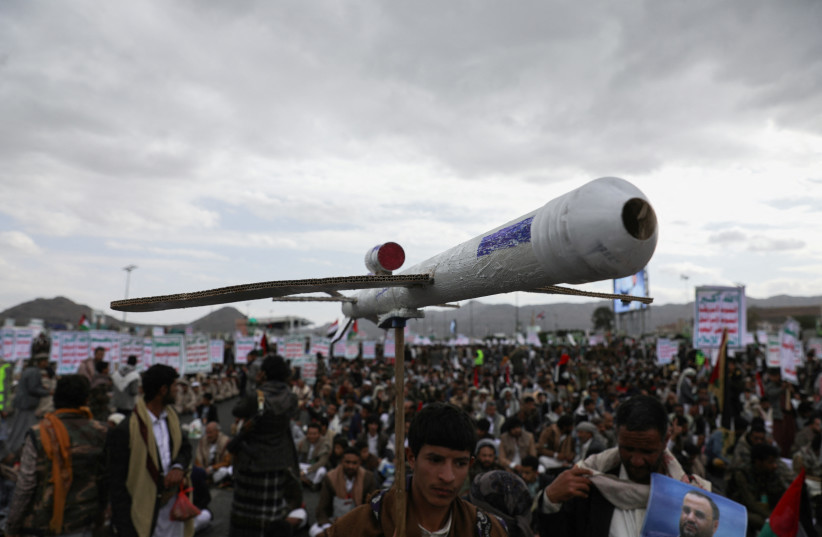Absent a ceasefire deal, the Iranian-backed Houthis of Yemen will likely escalate their attacks in the region, a Meir Amit Intelligence and Terrorism Information Center report said on Monday.
The intelligence center is known to be close to the Israeli intelligence establishment, given that its members are all former members of the intelligence community, but it mostly utilizes open-source intelligence for its analyses.
According to the center, there is a wide mix of agendas regarding the Houthis’ provocative activities.
Even between the US and its Western and Sunni allies, the report said there are differences about how to handle the Houthis and how far to escalate counterattacks on Yemen’s soil versus merely shooting down Houthi attacks.
Then there are differences between Iran and the Houthis, with sources telling The Jerusalem Post that sometimes the Yemen terror group has gone beyond its sponsor’s orders.
Houthis are going beyond Iran
Some sources have told the Post that Tehran has even ordered the Houthis to tone down certain attacks that could unify the West and the Sunni countries, only to be ignored by its proxy, which retains some independence.
This came after reports of negotiations between the US and Iran to reduce tensions relating to Yemen even if other sources of tension may remain open.

Despite these sources, the intelligence center report said that either the Islamic Republic or an Israel-Hamas ceasefire were the main ways that the West could reduce conflict with the Houthis, given the West’s disinclination to engage deep into Yemen soil and the West’s failure to deter the Houthis to date.
According to the report, Houthi leader Abdul-Malik al-Houthi has publicly repeated numerous times in February and March that only the halting of attacks on Gaza can halt his forces’ attacks.
Moreover, the report said that Houthis spokesman Yahya Sare’e has recently echoed similar messages.
In addition, the report noted the Houthis’ articulation of a worldview in which they unite with Iran, Russia, and China in a long-term struggle.
The report noted that continuing through the first three months of 2024, the Houthis have continued, almost uninterrupted, to attack targets they define as being “Israeli,” “Israel-linked,” or “supporters of Israel” (mostly the US and EU countries) traveling through the Red Sea.
Further, the Houthis more recently have threatened to start attacking ships traveling through the Indian Ocean and through sea lanes that circumvent Africa from the south.
The intelligence center suggested that if the Houthis start attacking shipping interests in the Indian Ocean, this could cause a paradigm shift and lead to the West engaging militarily more significantly on Yemen’s soil.
In contrast, the Houthis have reduced the volume of their attacks on Israel since the start of the war.
The center said this likely was not because of a lower motivation to strike Israel, but rather the reality that attacks on Israel have almost entirely failed and the volume of long-range ballistic missiles and drones the Houthis possess is likely far more limited compared to the shorter-range weapons it can use to attack international shipping.
Next, the report noted that last week, the Houthis did succeed at breaking through the IDF’s missile defense shield when a cruise missile landed in an open space north of Eilat.
However, even in that case, there was no damage and following that attack, the IDF shot down the Houthis’ next attempted aerial attack on Eilat at a safe distance.
The Houthis first started attempts to strike Israel, mostly in the Eilat region, in mid-October 2023. Since then, they also attacked several dozen times against US and allied shipping interests in the Red Sea, saying that these countries were supporting Israel militarily or economically.
At first, the US and the West were passive on the issue, but eventually they started to counterattack against Houthi drone and rocket bases, but still with clear limits to avoid an escalation.
